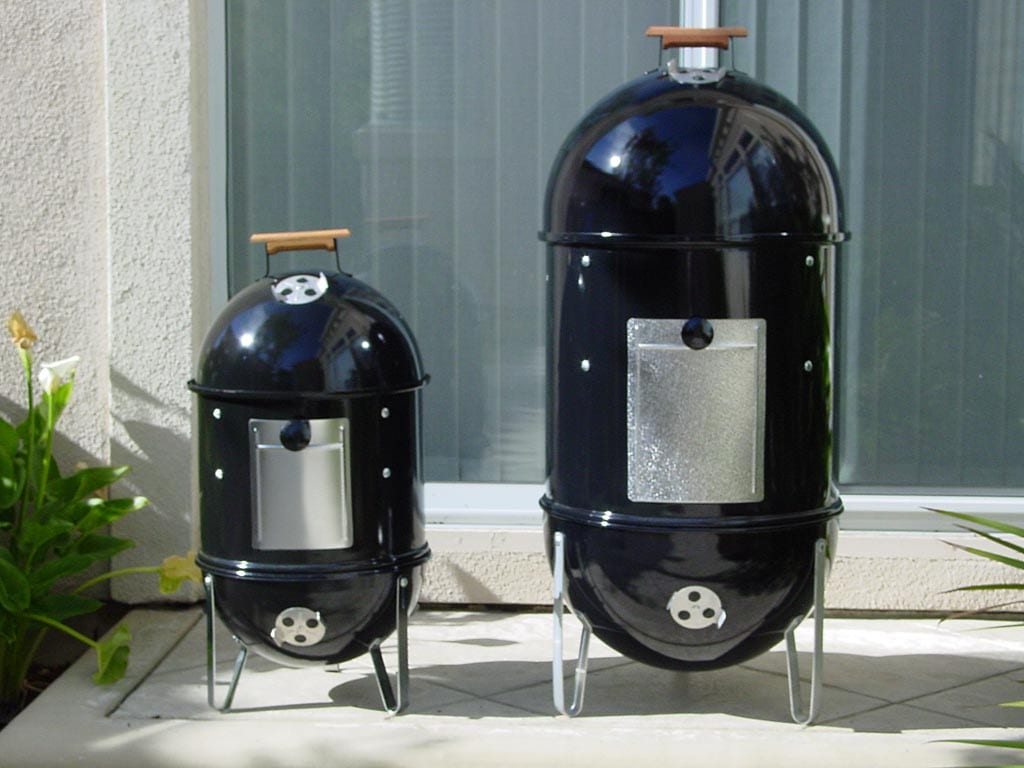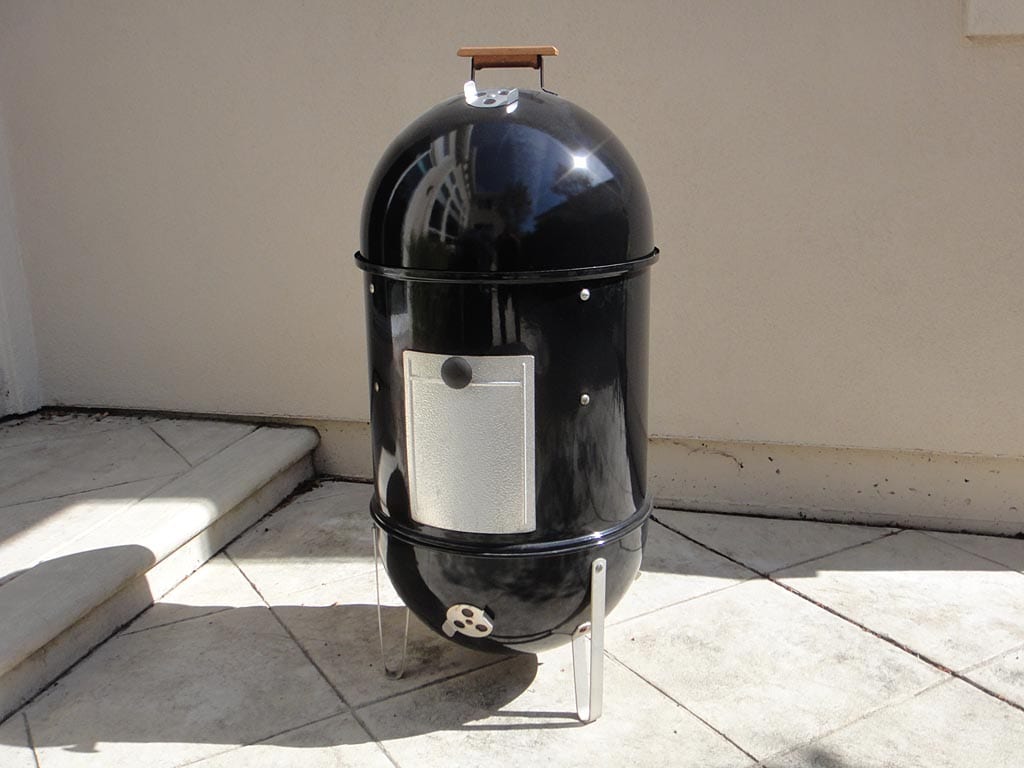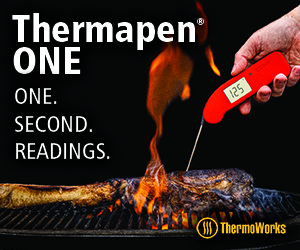Models 1880, 2880/2890/2820, 711001, 721001, 731001
Here’s the history of the Weber Smokey Mountain Cooker Smoker as best I understand it. If you have additional information to share on this topic, please send it along by e-mail.
1981: Model 1880 & 2880
“There’s an old Smokey Mountain tradition: when you build something, you build it to last. Now there’s a smoke cooker worthy of that timeless tradition. You’ll love what it does to fish, meat and game…season after season, year after year.”
– Weber Smokey Mountain Cooker Owner’s Manual, 1981
In 1981, Weber introduced two Smokey Mountain Cookers: The Model 1880 14.5″ cooker and the Model 2880 18.5″ cooker. According to a 1983 Washington Post article about smokers, the Model 1880 sold for about $100 and the Model 2880 sold for about $120.
According to Erich Schlosser, Senior Project Engineer for Weber R&D and inventor of the Weber Smokey Mountain Cooker, the inspiration behind the WSM was his boyhood memories of his German father cold-smoking meat. However, the smoker Erich wanted to create would be a hot-smoker, not a cold-smoker.
Unfortunately, there was no budget at the time to build a smoker from scratch, so Erich cobbled together a prototype using existing parts from other Weber grills. For the 18.5″ WSM lid and charcoal bowl, he used two charcoal bowls from the 18.5″ kettle grill. For the water pan, he used the lid from a Smokey Joe. The door knob and latch were “off-the-shelf” parts from the local hardware store. The only pieces that had to be specially fabricated were the bottom cooking grate, the charcoal grate and charcoal chamber, and the door, legs, and grill straps.
Somehow, Erich convinced Weber to bring these “Frankensteined” cookers to market in 1981.
The smaller Model 1880 was discontinued in 1983. “I don’t think the marketing folks promoted it very well,” said Erich.
The story of these early cookers was discussed further by Weber Executive VP and CMO Mike Kempster, in a blog post about the 2013 reintroduction of the 14.5″ Weber Smokey Mountain Cooker that appeared on Weber.com in January, 2014. Mike writes:
“Long before we started selling Weber Smokey Mountain Cookers people were enjoying the smoky flavor of beef brisket, ribs, pork shoulder and chicken at their favorite barbecue restaurant. In my travels, I would search out barbecue restaurants that were local favorites and I would talk to the pit master. There was always an interesting story about their barbecue pit’s design. Although restaurants were using hickory, mesquite or post oak from the same region, diners would swear that the meat tasted different because of the unique design of the pit. I grew up in Kansas City and I remember lively debates between my dad and uncles over which restaurant served the best barbecue, and the nuances in pit design, rubs, sauces and type of wood used.
“In the late 1970’s many barbecue enthusiasts wanted to try smoking in their own backyard. We didn’t invent the backyard smoker, and we were far from the first grill manufacturer to get into the business. We surveyed consumers listening intently to what they liked and disliked about backyard smokers. I attended many research sessions where smoke was in the air and my clothing smelled like mesquite or hickory-smoke for months.
“We introduced the 18.5” diameter Smokey Mountain Cooker in the spring of 1981 and sales really took off. We knew we had a winner but some consumers commented that it was a large and expensive smoker, particularly if they were trying smoking for the first time. We had all the presses and welding equipment to make a smaller model, so we quickly tooled-up and introduced a 14.5” model that we debuted at the National Hardware Show in August of 1981.
“Well let’s just say that we pulled the trigger on this model before we had done enough consumer research. While backyard smoking was gaining in popularity, it was far from what it is today.
“Today, many restaurants that do not specialize in barbecue, serve planked salmon or cuts of beef cooked in wood-fueled ovens. Americans across the country love smoky flavor and many find the 14.5” smoker just the right size for the foods they like to smoke. So this time around, smoking is mainstream, we’ve done our homework and we’re pleased to bring back an updated version for 2014.”
Model 1880 In Detail
I was fortunate enough to find a Model 1880 in pristine condition in Southern California in 2004. Here are some photos of this pint-sized WSM.
Here’s a view of the top cooking grate. Note that it does not have handles.
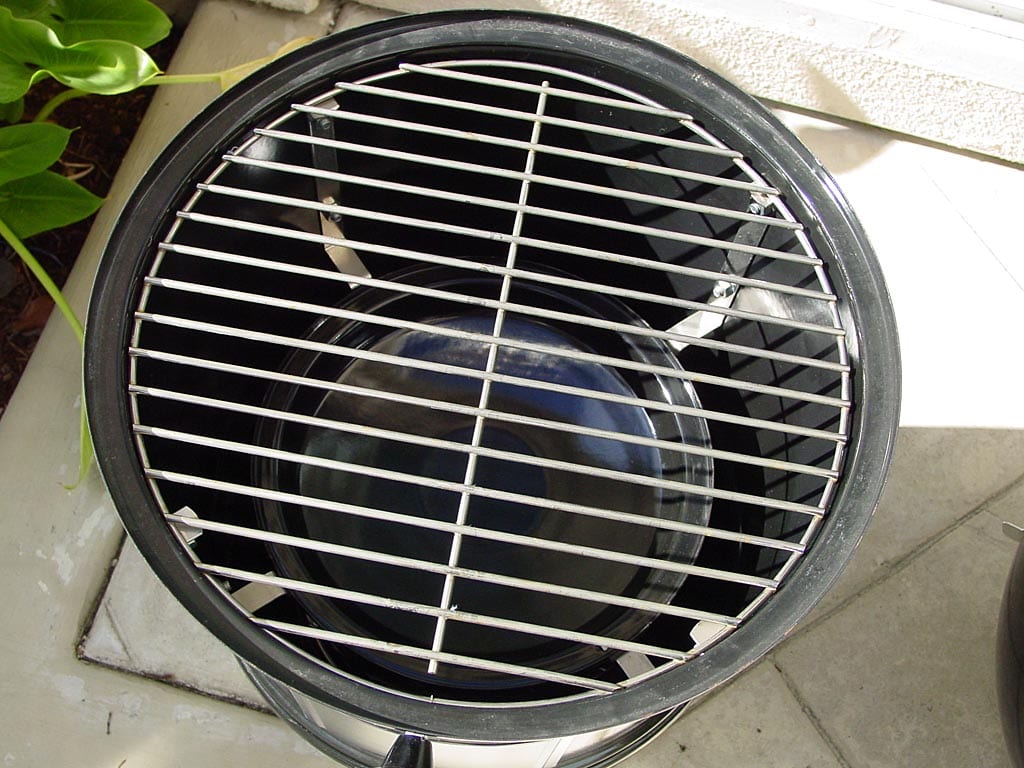
Here’s a view of the water pan. Notice the wide, flat rim, followed by near-vertical walls, then a gently sloping bottom that terminates in a flat, 3″ circle at the center of the bottom of the pan. The flat rim and tight fit against the grill straps results in a very stable water pan.
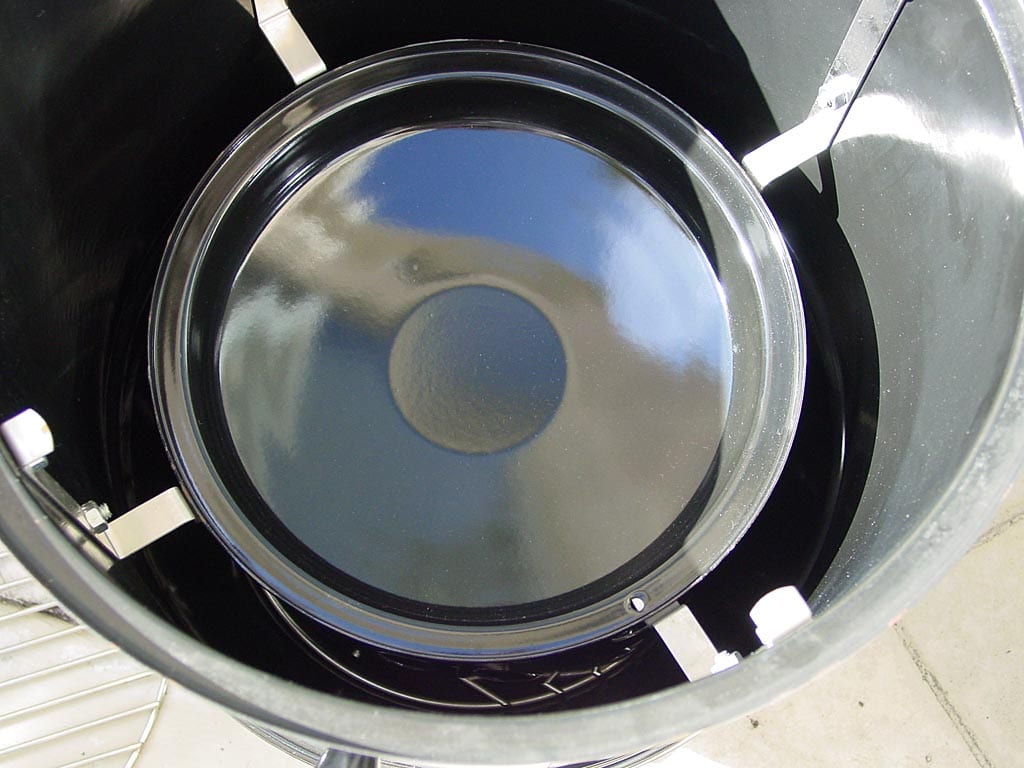
Here’s a shot of the charcoal chamber and charcoal grate. The chamber is made of the same material as today’s cooker, but is smaller in diameter. The charcoal grate is not only smaller in diameter, but made of smaller gauge metal stock than the current grate.
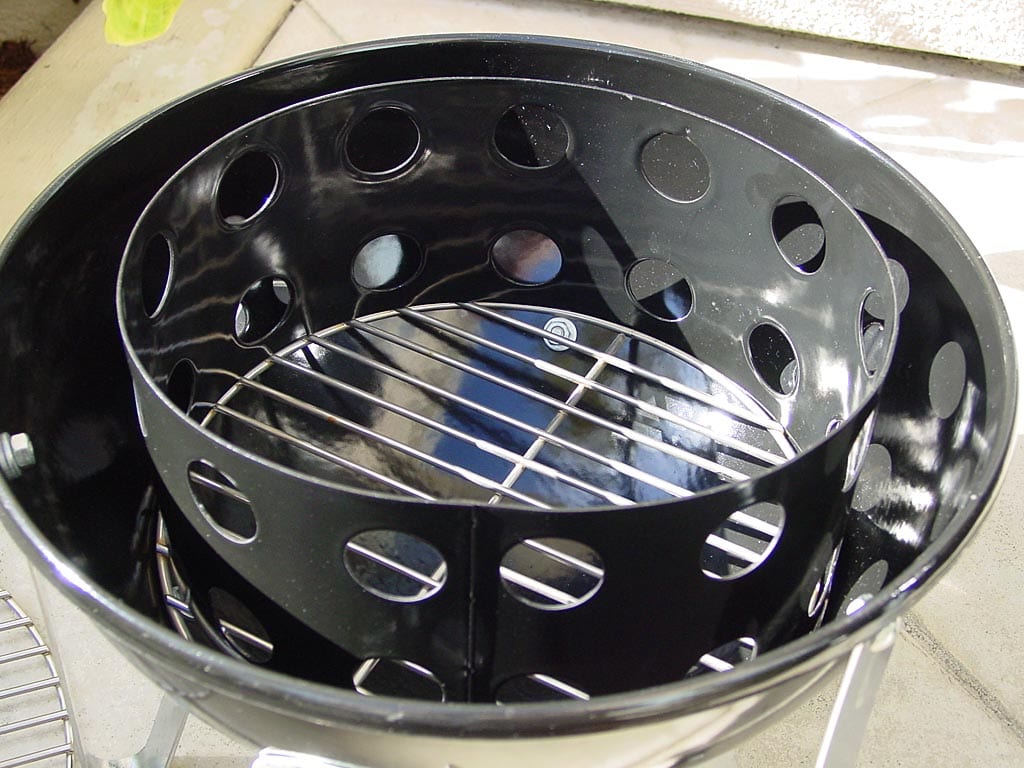
Here’s the wooden lid handle with the Weber logo is stamped into the wood.
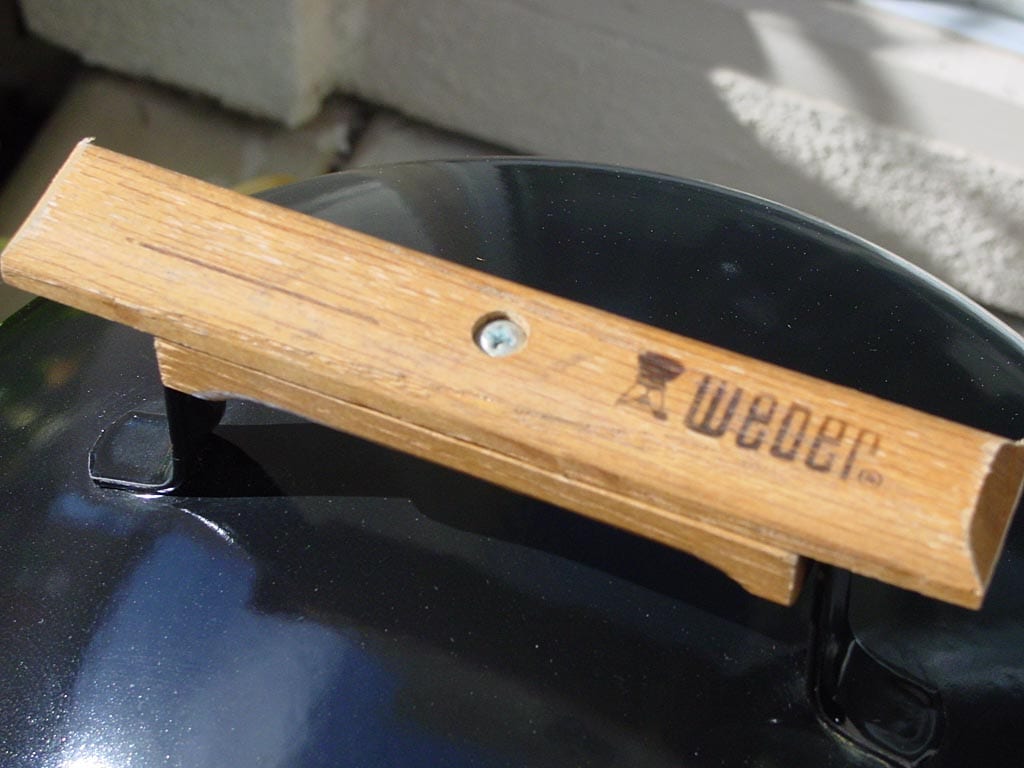
Here you can see the letter “C” on the charcoal bowl damper, indicating that this bowl was manufactured in 1981.
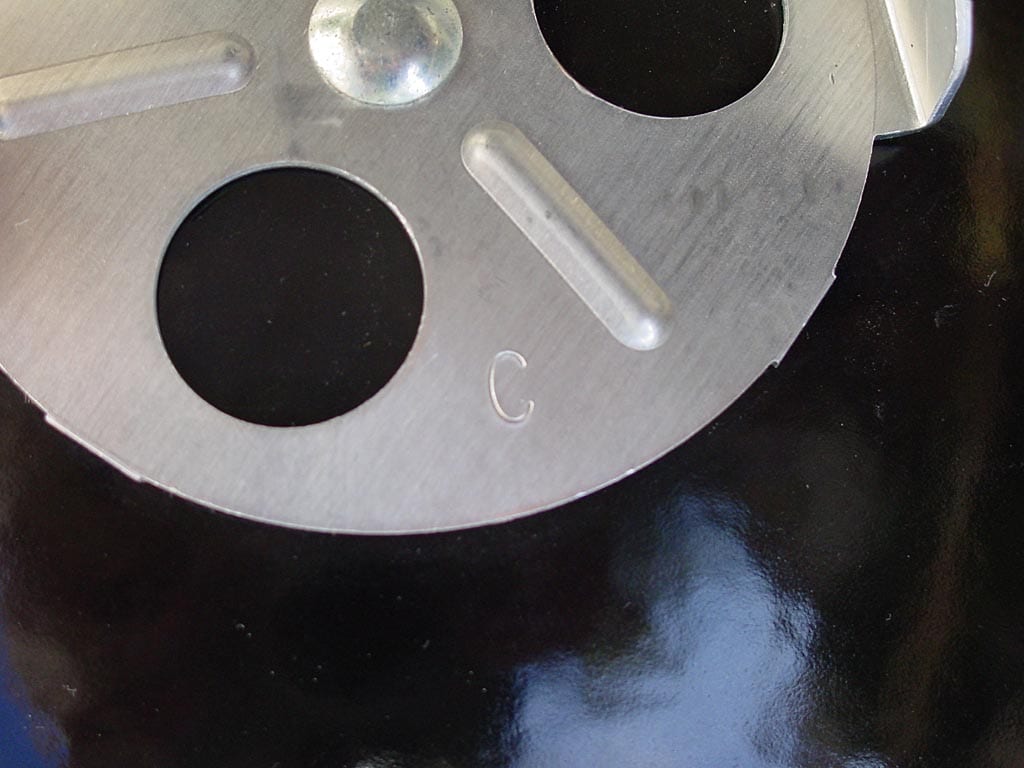
And here you can see the letter “E” on the lid damper, indicating that this lid was manufactured in 1983. (It’s not clear why this cooker has a mismatched lid and bowl.) See How To Determine The Age Of Weber Grills & Smokers for more information on Weber’s lettering scheme.
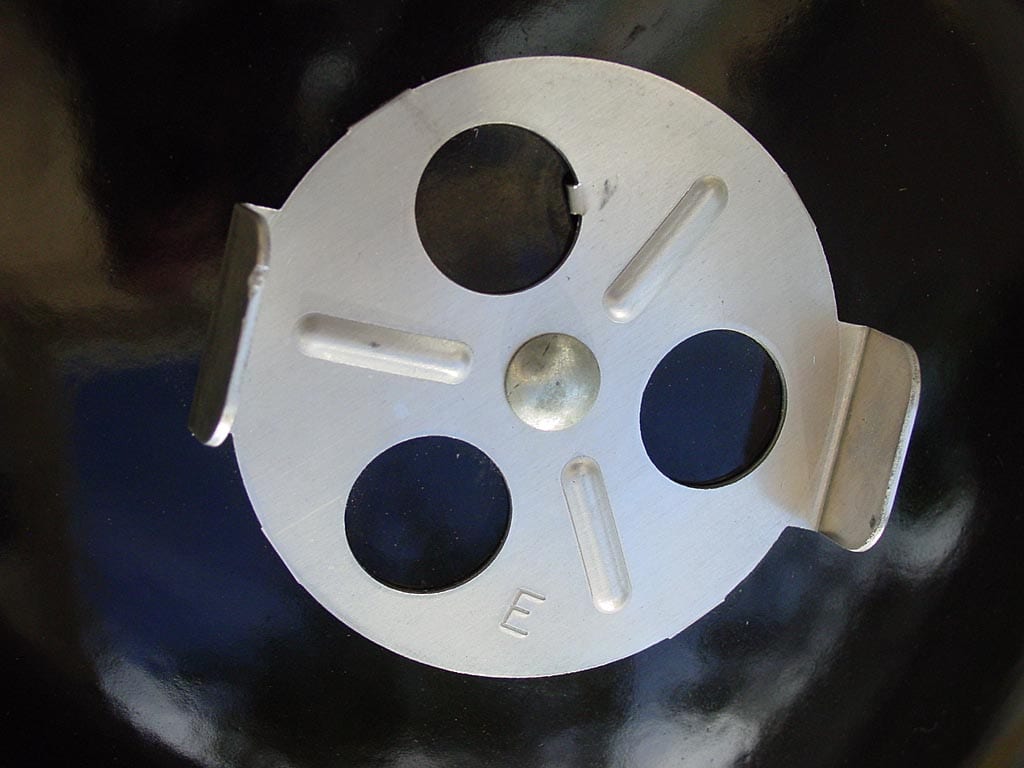
The dampers on the 1880 are made of aluminum and are stamped with a series of lines between the vent holes. The dampers are attached using the same tubular aluminum rivets as in today’s WSM.
This photo shows the access door. It is made of nickel-chromium plated steel and is much heavier than today’s aluminum door. The door has a smooth finish, but it sports the same “H” pattern stamped into the door like today’s door, which helps it retain its shape.
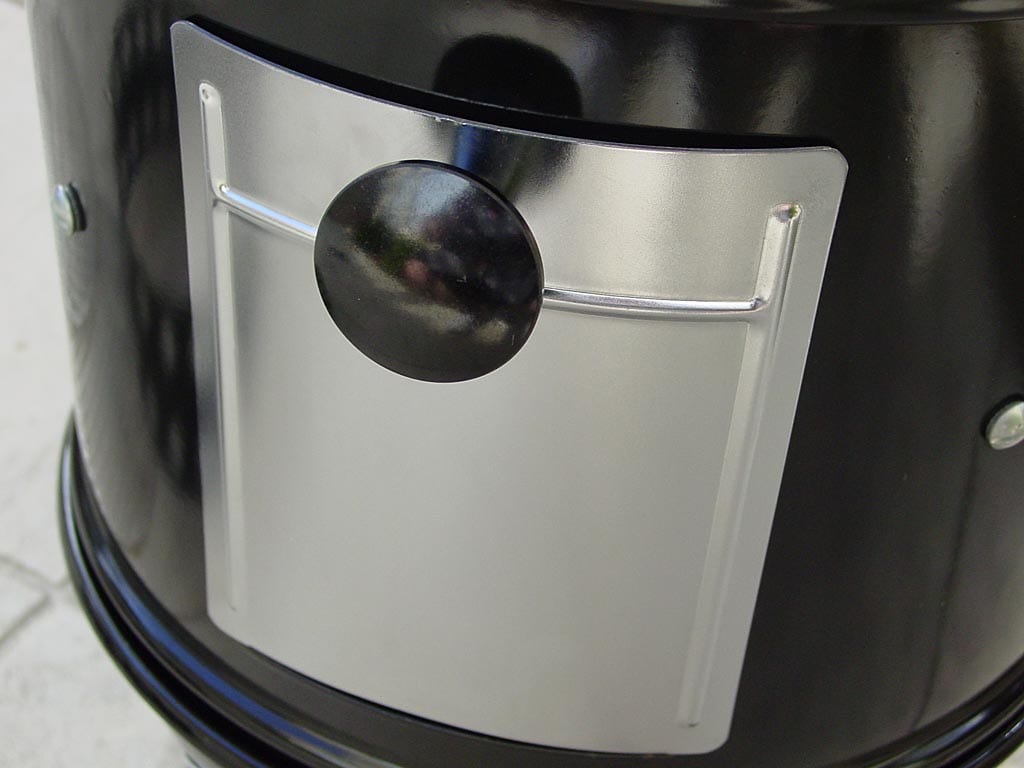
The 1880’s legs are made of the same nickel-chromium plated steel as the access door. Although these legs are sturdy, they apparently had a tendency to rust (like the access door) and were eventually replaced with aluminum parts.
Comparing The 1880 & 2880
This photo shows the 1880’s top cooking grate placed over that of the 2880.
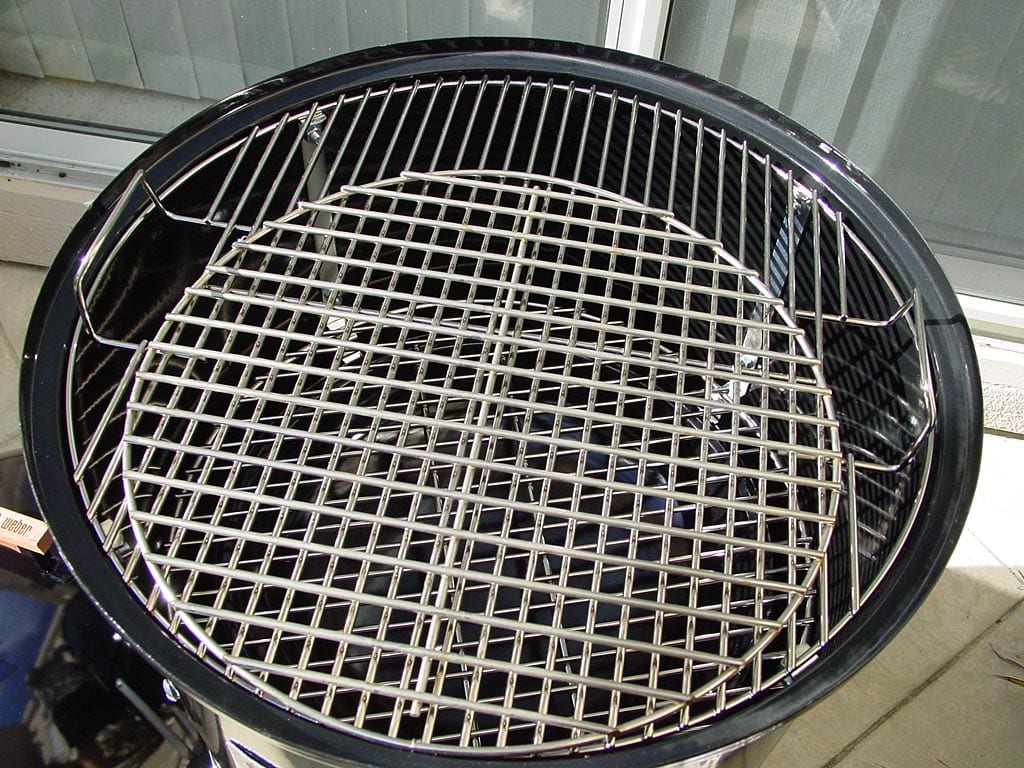
The next two photos compare the 1880’s water pan with that of the 2880.
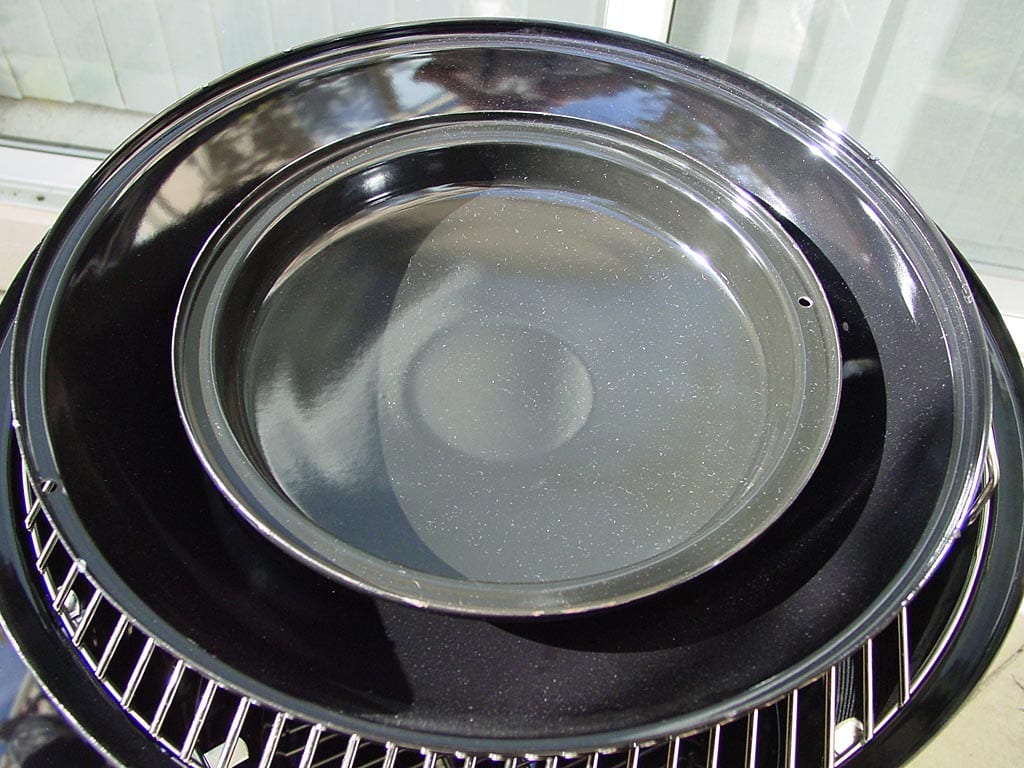
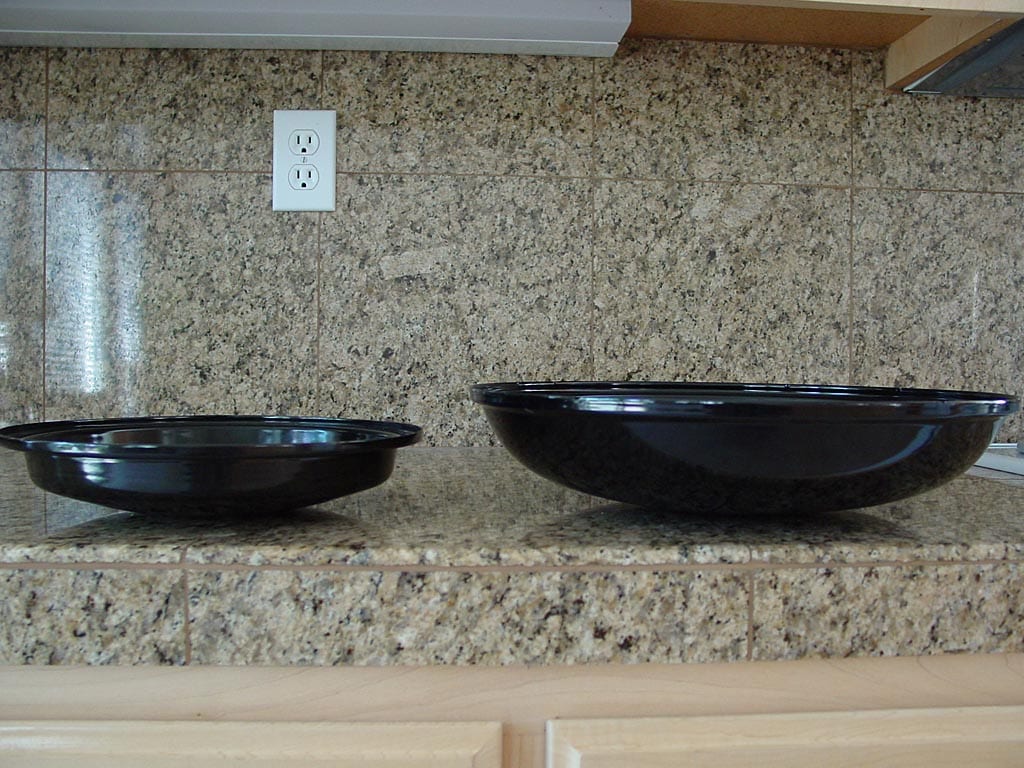
This photo shows the difference in size between the 1880’s charcoal chamber and that of the 2880.
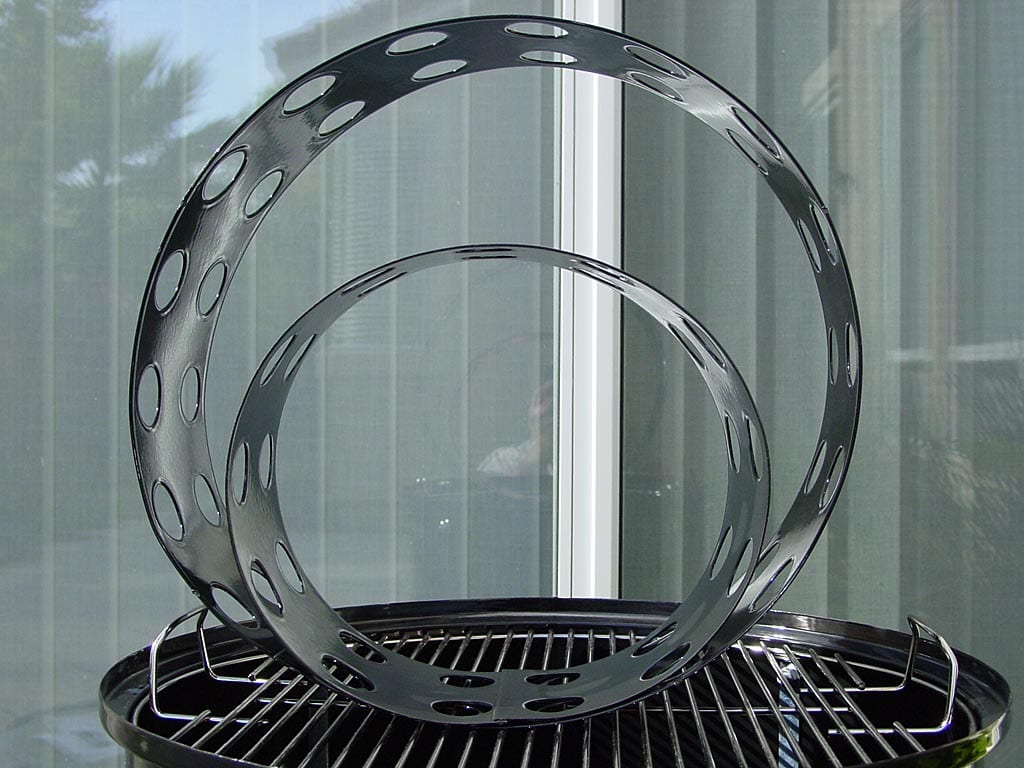
This photo shows the 1880’s charcoal grate placed over that of the 2880.
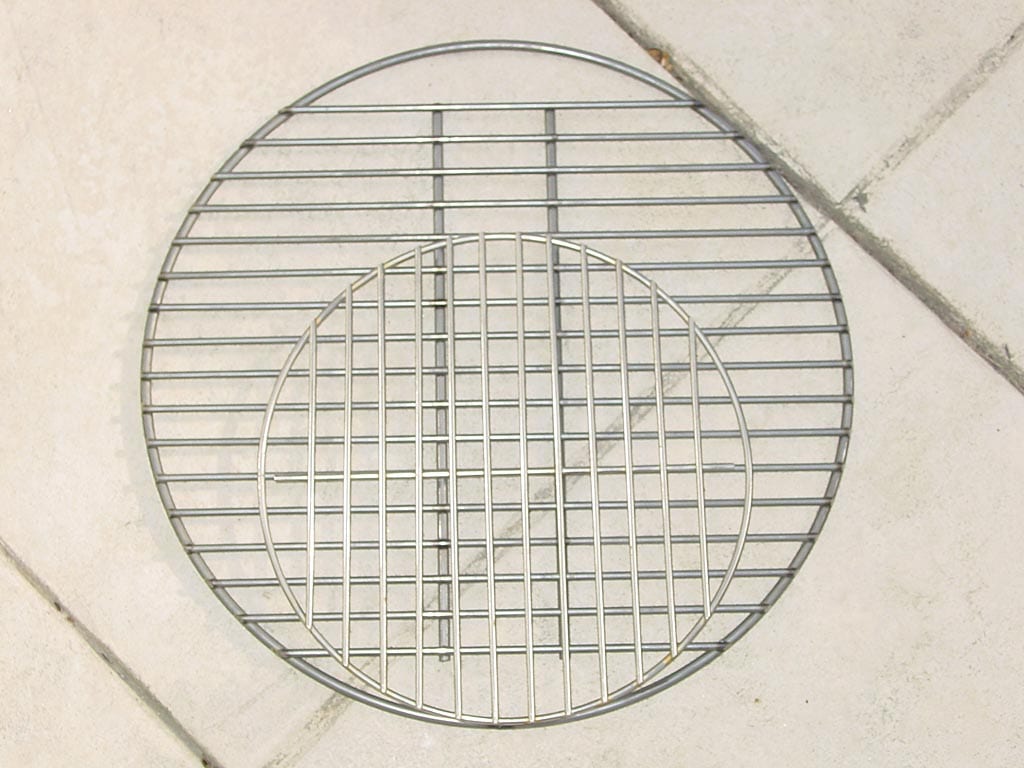
Here are the detailed measurements comparing the 1880 with the 2880:
| Model 1880 14.5″ | Model 2880 18.5″ | |
| Overall height | 29″ | 41″ |
| Top cooking grate diameter | 13-1/2″ | 17-1/2″ |
| Distance between cooking grates | 5-1/2″ | 7-1/2″ |
| Access door opening | 5″ x 7″ | 7-1/4″ x 10″ |
| Water pan width | 10-3/4″ | 14-3/4″ |
| Water pan depth | 2″ | 3-1/16″ |
| Water pan capacity | 1-1/2 quarts | 1 gallon |
| Charcoal chamber diameter | 10″ | 14-1/2″ |
| Charcoal chamber height | 4-3/4″ | 4-3/4″ |
| Charcoal grate diameter | 10-3/8″ | 15-1/4″ |
A copy of the Model 1880 assembly instructions and parts list can be downloaded from the WSM Owner’s Manuals page.
If you have additional information about the Model 1880 (for example, the original retail price, interesting stories, etc.), please send it in and I’ll consider including it here.
Models 2890/2820
 At some point the Model 2880 cooker was renamed Model 2890 and was known by this model number as recently as 1999. We suspect the renaming coincided with the switch from nickel-chromium plated steel legs and access door that tended to rust to aluminum parts that did not rust and occurred around 1983-84.
At some point the Model 2880 cooker was renamed Model 2890 and was known by this model number as recently as 1999. We suspect the renaming coincided with the switch from nickel-chromium plated steel legs and access door that tended to rust to aluminum parts that did not rust and occurred around 1983-84.
Some of these grills had a diamond pattern stamped into the access door, while later versions had a pebbled finish.
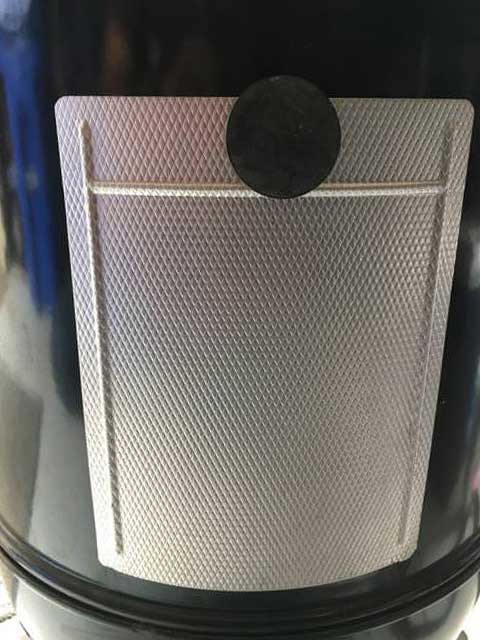
In 2000, the cooker was renamed Model 2820, coinciding with the lid handle change from wood to nylon.
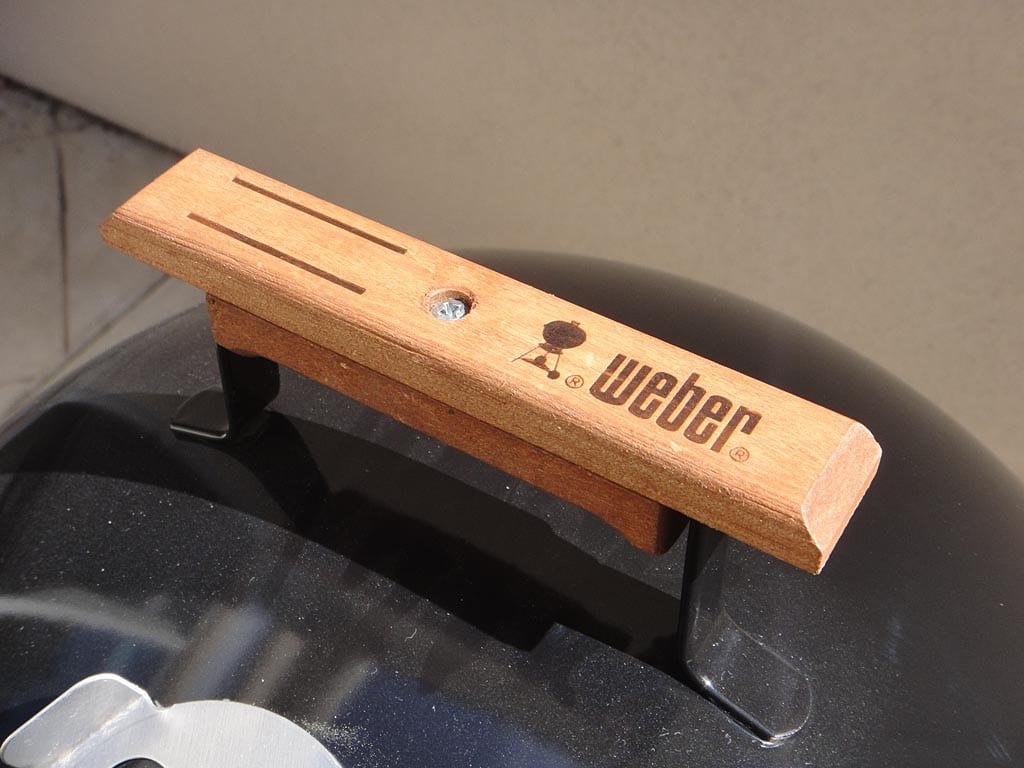
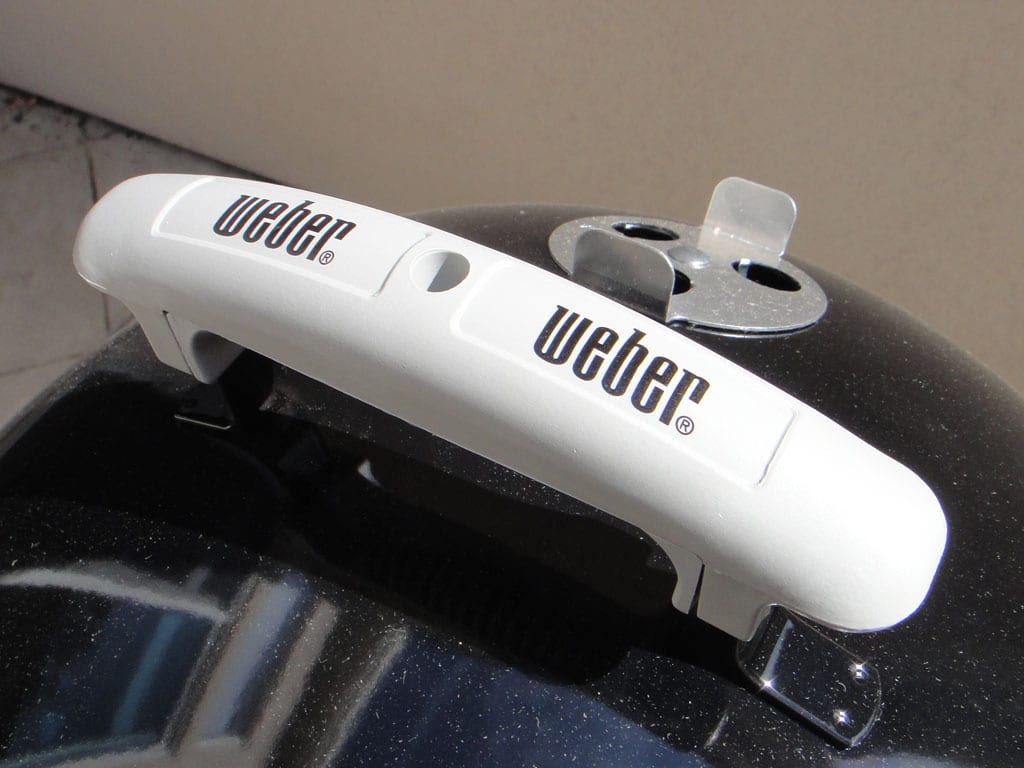
One way of differentiating older WSMs from newer ones is by the lid handle. The Model 1880 and Model 2880 had teak lid handles with the Weber logo stamped into the wood. Some years later, Weber switched to an unknown species of wood that was stained to resemble teak, and they continued to stamp the Weber logo into the handle.
2009: Models 721001 And 731001
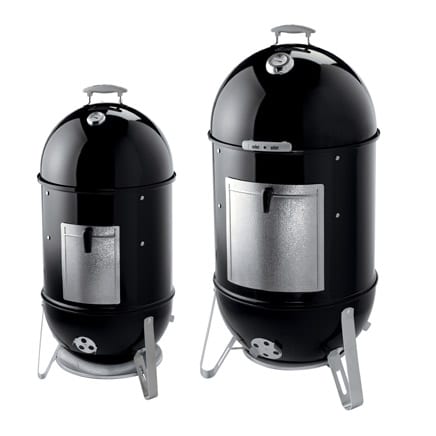
In October 2008, Weber announced the improved Model 721001 18.5″ cooker and the all-new, larger Model 731001 22.5″ cooker for the 2009 model year.
Improvements to the Model 721001 18.52″ cooker included:
- Built-in lid thermometer with 1.5″ stem.
- Temperature range of 100-350°F in 5°F increments.
- Improved access door.
- Door handle indicates locked position.
- Latching mechanism pulls door tight to middle cooking section.
- Clever new design allows the door to be removed entirely or have it open downward but still attached to the cooker—without hinges.
- Improved water pan.
- 2.5 gallon capacity.
- More solid fit on grill straps.
- Slightly less headroom between bottom of water pan and charcoal chamber.
- Sturdier legs.
- Heat shield mounted to the legs under the charcoal bowl protects patio or deck.
- Improved packaging protects the product during journey from factory to front porch.
- Updated owners manual operating instructions and modern recipes.
The Model 731001 22-1/2″ cooker included all of the features of the Model 721001 18.5″ cooker listed above, plus:
- Two 22″ cooking grates.
- Additional handle on edge of lid to assist with lifting.
- Larger 4-1/4″ vent dampers, each with four 3/4″ holes.
- Taller, wider access door opening.
- Three-gallon water pan.
- Improved charcoal grate prevents charcoal from falling through into the bowl.
- Larger charcoal chamber holds an entire warehouse club-sized bag of briquettes.
- More headroom between the top cooking grate and the lid, and more space between the top and bottom cooking grates.
Comparing The 721001 And 731001
This photo shows the 721001’s top cooking grate placed over that of the 731001.
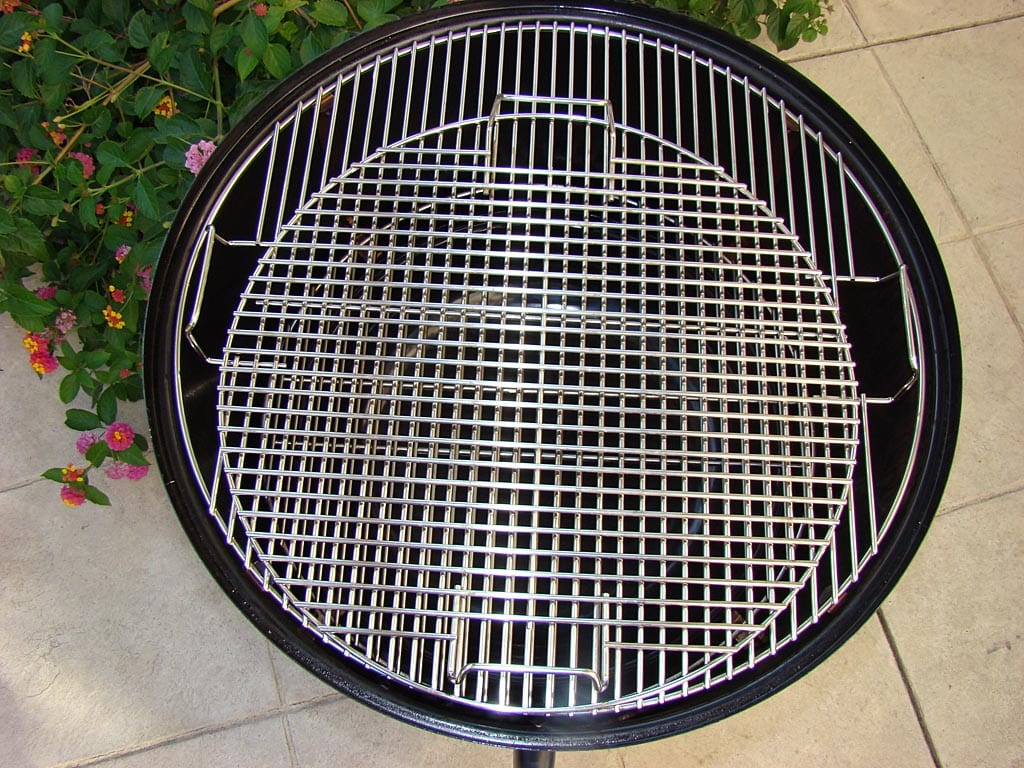
This photo shows the 721001’s bottom cooking grate placed over that of the 731001.
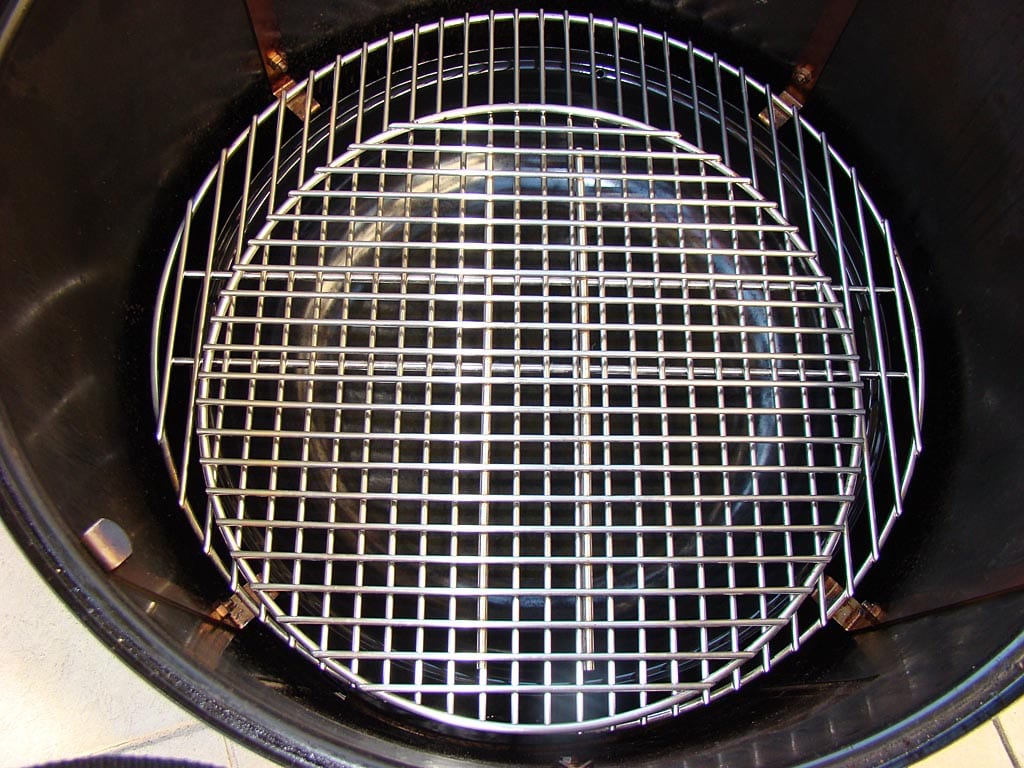
The next three photos compare the 721001’s charcoal chamber with that of the 731001.
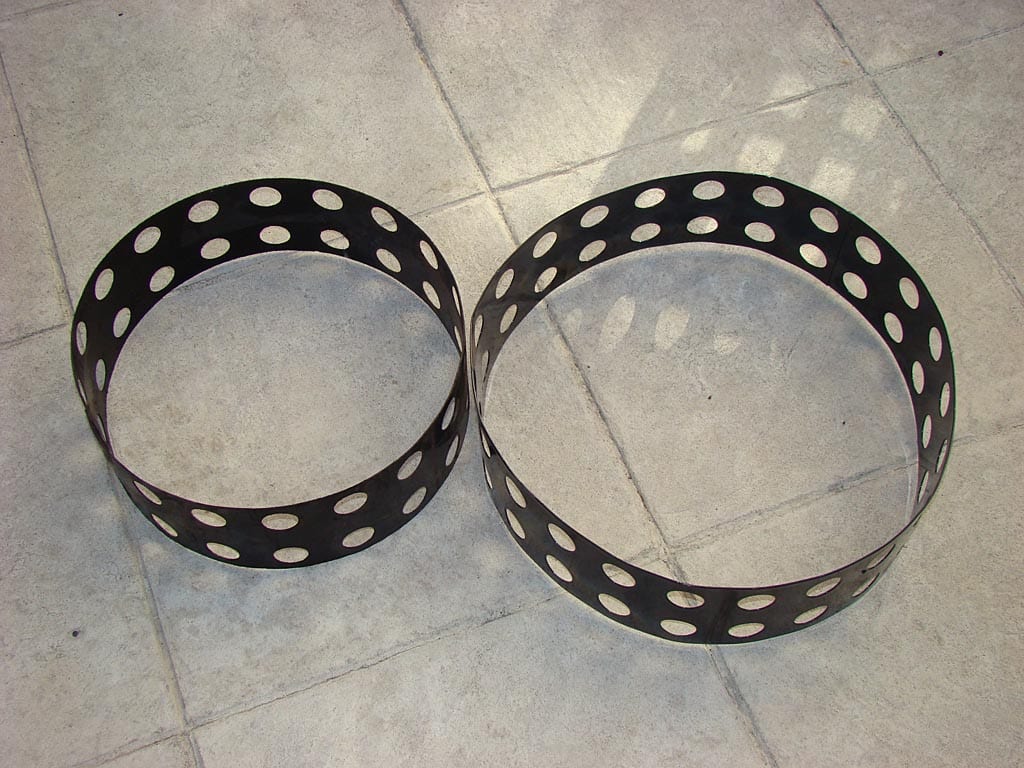
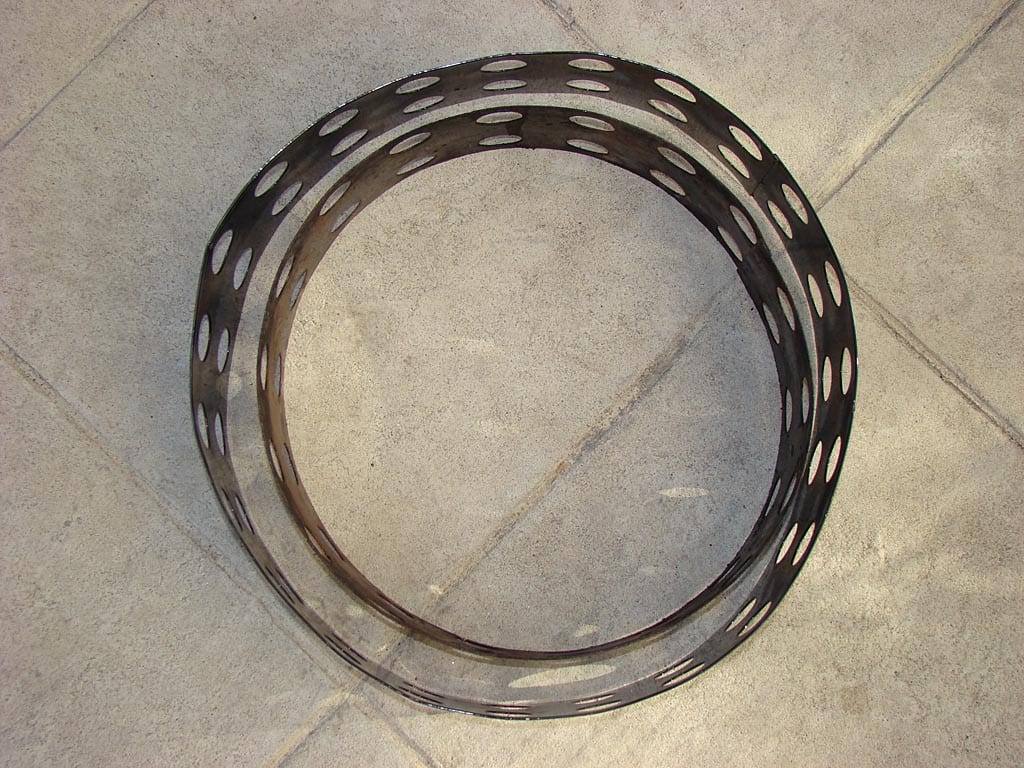
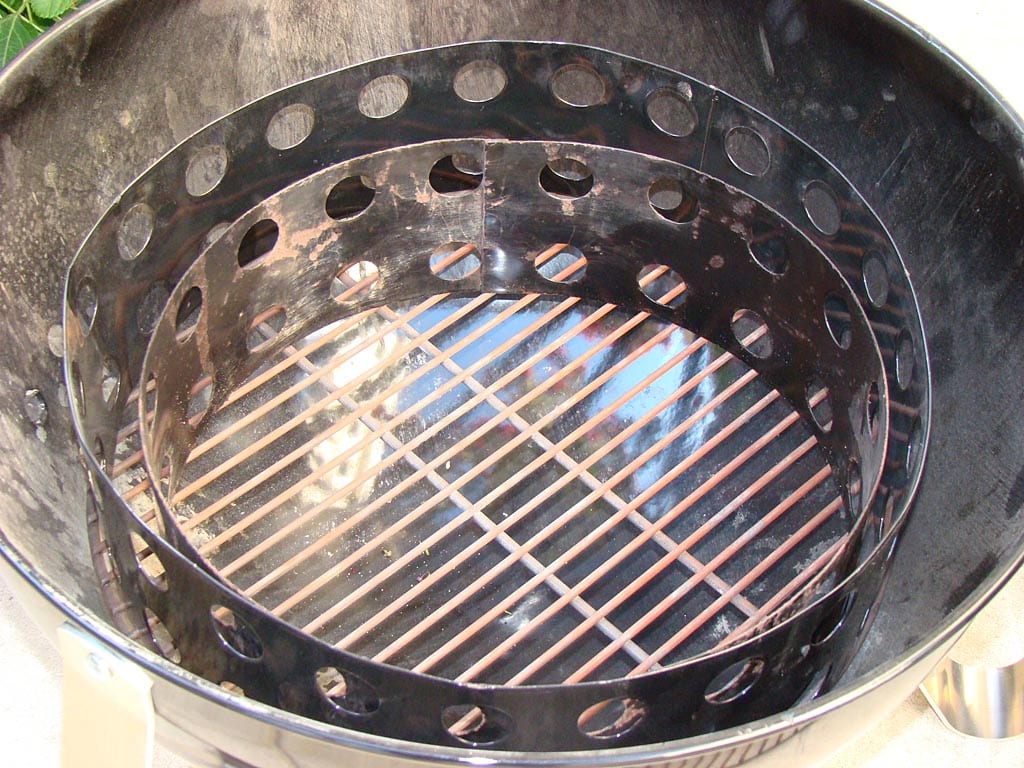
Here are the detailed measurements comparing the 721001 with the 731001:
| 2009 Model 721001 18.5″ | 2009 Model 731001 22.5″ | |
| Height | 41-1/2″ | 48-1/2″ |
| Width | 18-7/8″ | 22-7/8″ |
| Weight | 37 pounds | 52 pounds |
| Top cooking grate | 17-1/2″ 240-1/2 sq. in. |
21-1/2″ 363 sq. in. |
| Bottom cooking grate | 17″ 227 sq. in. |
20-3/4″ 338 sq. in. |
| Distance between cooking grates | 7-1/2″ | 9″ |
| Water pan | 14-3/8″ x 7″ 2.5 gallons |
18-3/4″ x 4-1/4″ 3 gallons |
| Distance between water pan and charcoal grate | 5-3/4″ | 12-1/2″ |
| Charcoal chamber | 14-1/2″ x 4-3/4″ | 17″ x 4-3/4″ |
| Charcoal grate | 15-1/4″ | 17-3/4″ |
| Distance between charcoal grate and bottom of charcoal bowl | 4-1/2″ | 5-1/4″ |
| Lid | 18-1/2″ OD x 13″ (including handle) 10-1/2″ between inside top of lid and top cooking grate |
22-1/2″ OD x 14-5/16″ (including handle) 11-13/16″ between inside top of lid and top cooking grate |
| Lid damper | One 3″ damper with three 3/4″ holes | One 4-1/4″ damper with four 3/4″ holes |
| Thermometer | 100-350°F, 5°F increments 1-1/2″ stem |
100-350°F, 5°F increments 1-1/2″ stem |
| Thermometer hole in lid | 3/8″ | 3/8″ |
| Middle cooking section | 18-3/4″ OD / 17-5/8″ ID x 17-1/2″ 6″ between screw holes |
22-7/8″ OD / 21-3/4″ ID x 21-1/2″ 7-1/4″ between screw holes |
| Access opening | 7-1/4″ x 10″ | 12-3/4″ x 13-7/8″ |
| Access door | 8″ x 11-3/4″ | 14″ x 16-1/4″ |
| Access door knob | 3″ long | 3″ long |
| Charcoal bowl | 18-1/2″ OD x 10″ (without legs), 12-3/8″ (with legs) | 22-5/8″ OD x 12″ (without legs), 14-1/4″ (with legs) |
| Charcoal bowl dampers | Three 3″ dampers with three 3/4″ holes | Three 4-1/4″ dampers with four 3/4″ holes |
| Legs | Three, 11-1/2″ x 1-1/2″ | Three, 13-1/4″ x 2″ |
2010: Arched Access Door Opening Change
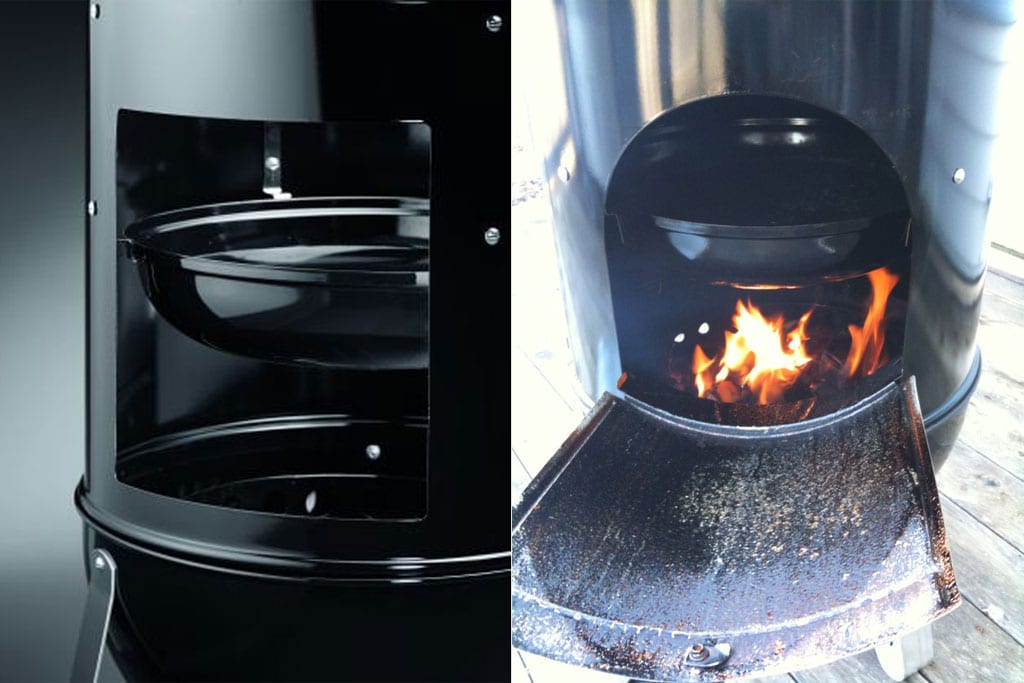
The large rectangular opening in the original 22.5″ WSM middle cooking section proved to be problematic. During the fabrication process, when the opening was punched into a flat piece of steel and the ends brought together and welded to form a cylinder, the narrow area above the door opening tended to flatten out, resulting in a poorly shaped part. The solution was to change the top of the opening to an arch. This added more rigidity during the fabrication process and resulted in a better shaped part.
2012: Lid Handle Design Change
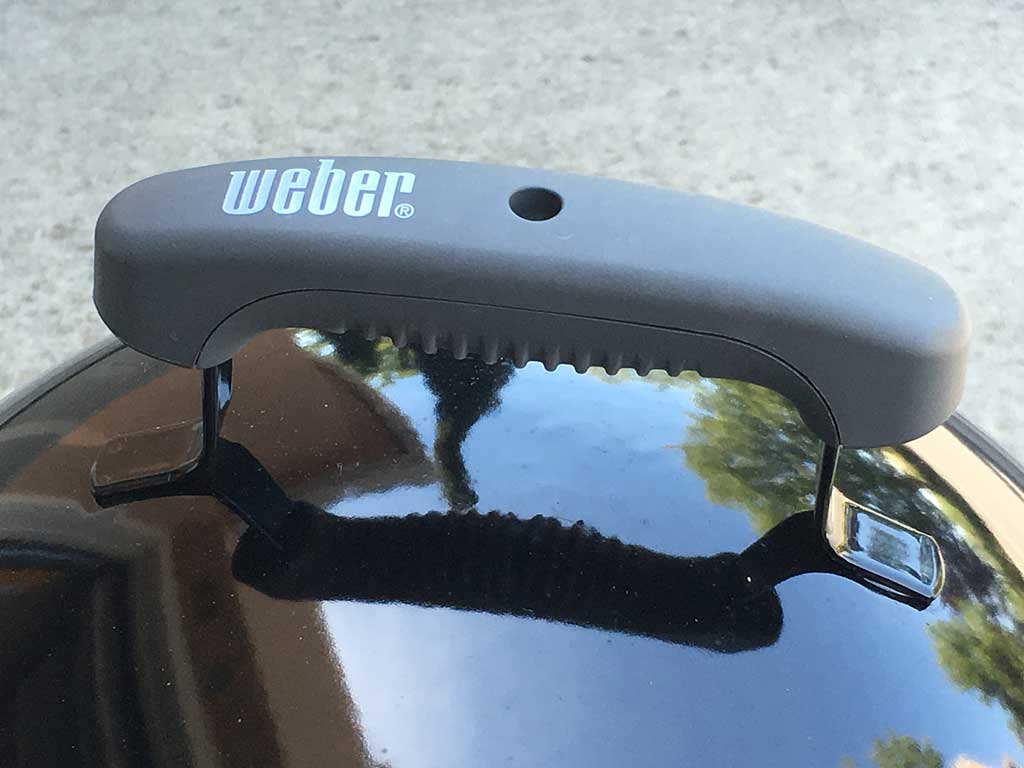
For the 2012 model year, Weber changed the color of the plastic lid handle from white to medium gray and changed the overall shape and grip design of the handle.
2014: New Model 711001 And Updates To Models 721001/731001
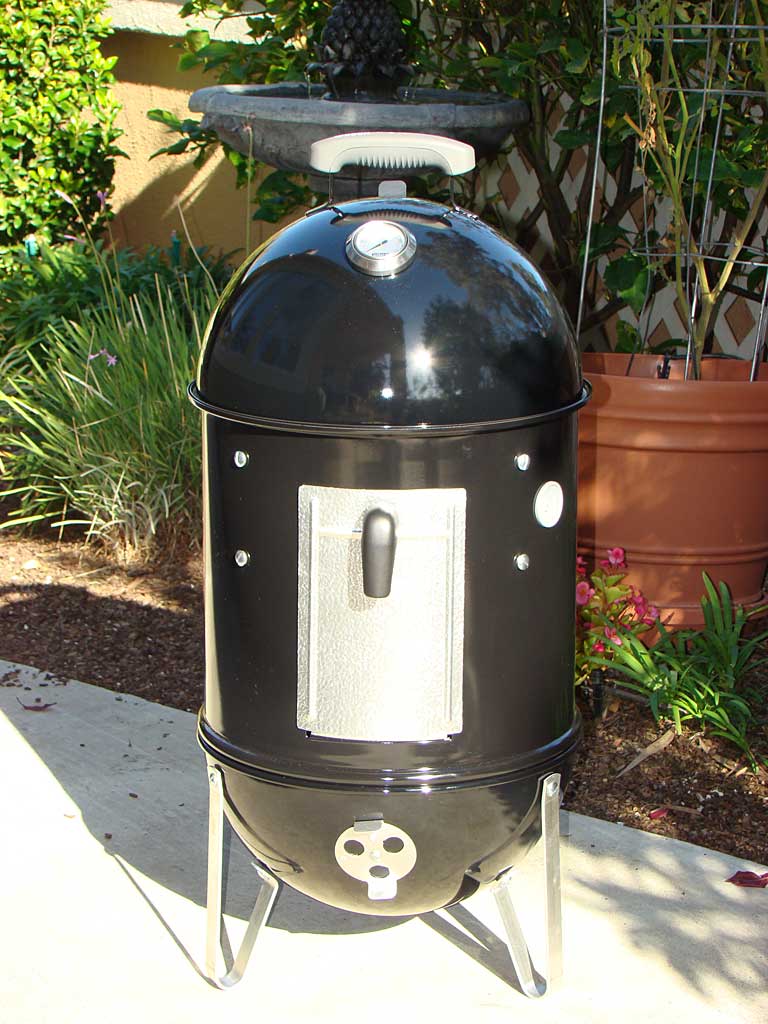
In October 2013, Weber announced the all-new Model 711001 14.5″ cooker for the 2014 model year, reintroducing a smaller sized WSM to the market.
You’ll recall that earlier in this article, Weber Executive VP and CMO Mike Kempster was quoted as saying the company had jumped the gun when it introduced the Model 1880 14.5″ WSM back in 1981, that consumers did not accept the product at that time. Well, things had changed big-time by 2008. In that year, the WSM was peaking in popularity with a new and improved 18.5″ version and the all-new 22.5″ version coming to market. At the same time, some handy barbecue enthusiasts started making their own Mini WSMs using a Weber 14.5″ Smokey Joe grill and a tamale pot for a middle cooking section. People started posting their creations on The Virtual Weber Bulletin Board and Weber took note of this development. As a result, in 2013 Weber resurrected their own version of the 14.5″ WSM.
Two new features were included with the new 14.5″ WSM that were also carried over to the 18.5″ and 22.5″ models:
- A silicone grommet that allows thermometers to be inserted into the middle cooking section
- Handles on the lower cooking grate
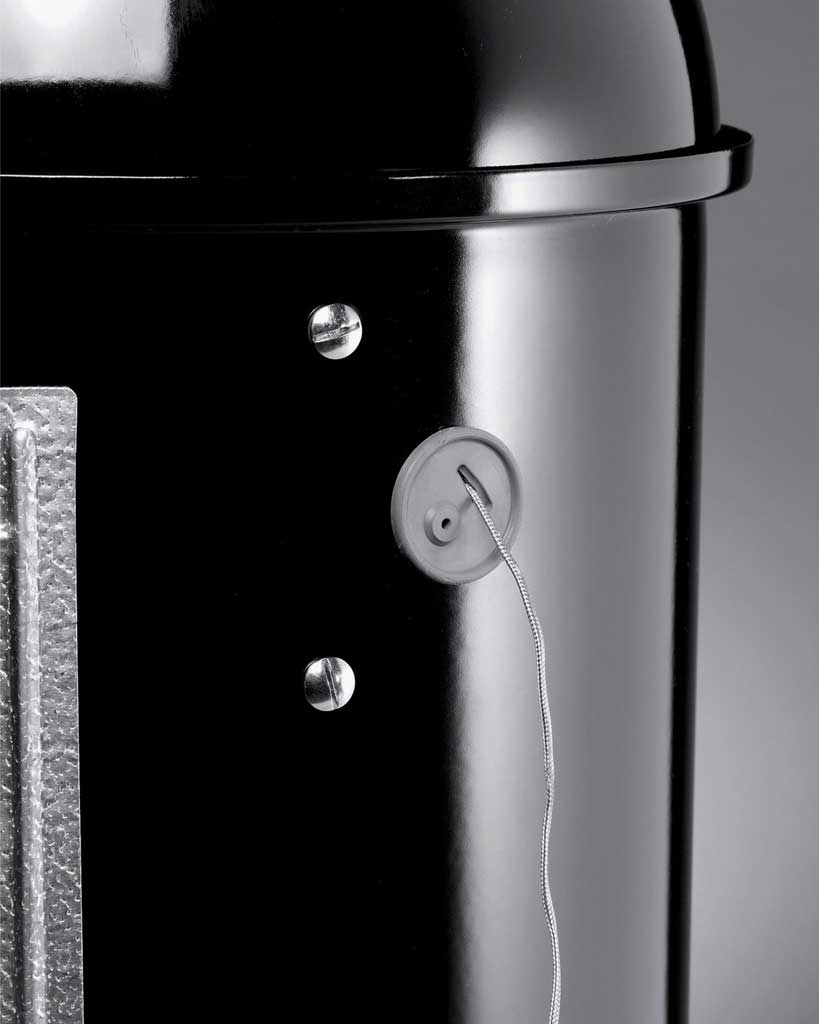
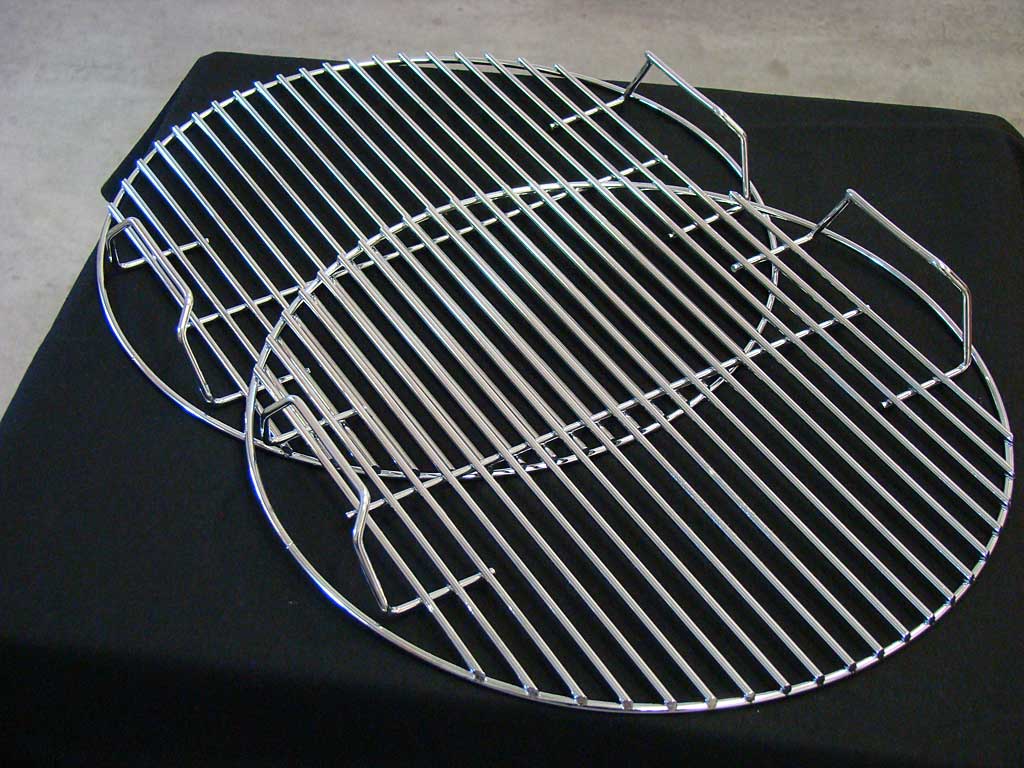
Comparing The 711001 And 721001
This photo shows the 711001’s top cooking grate placed over that of the 721001.
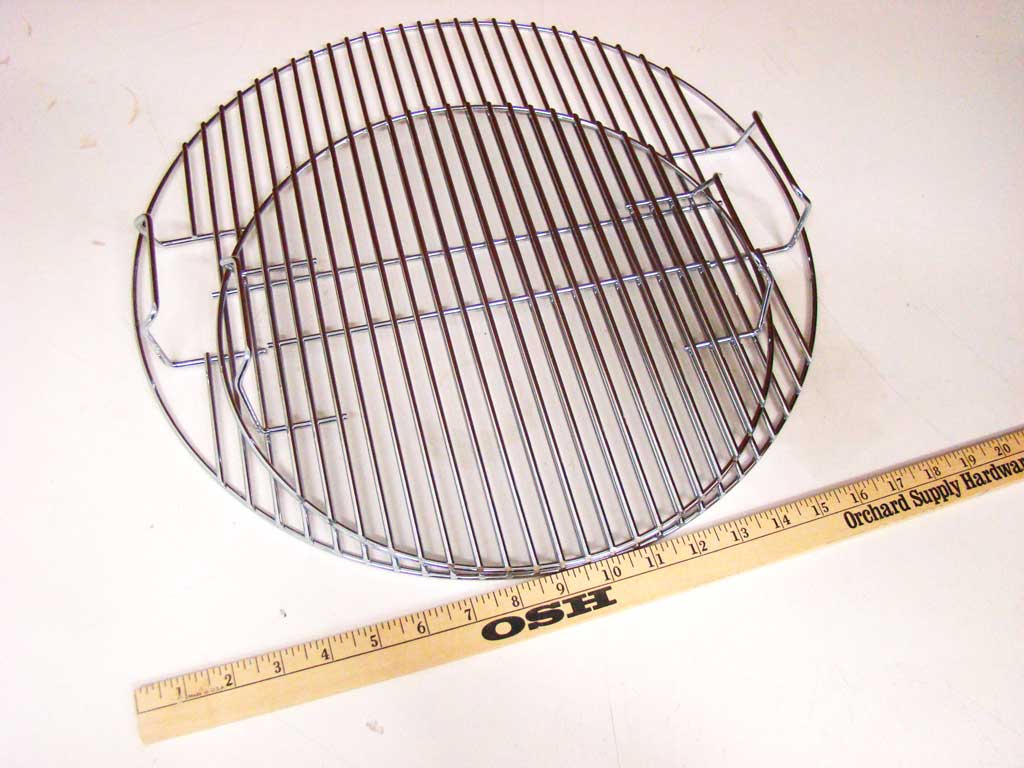
This photo shows the 711001’s charcoal grate placed over that of the 721001.
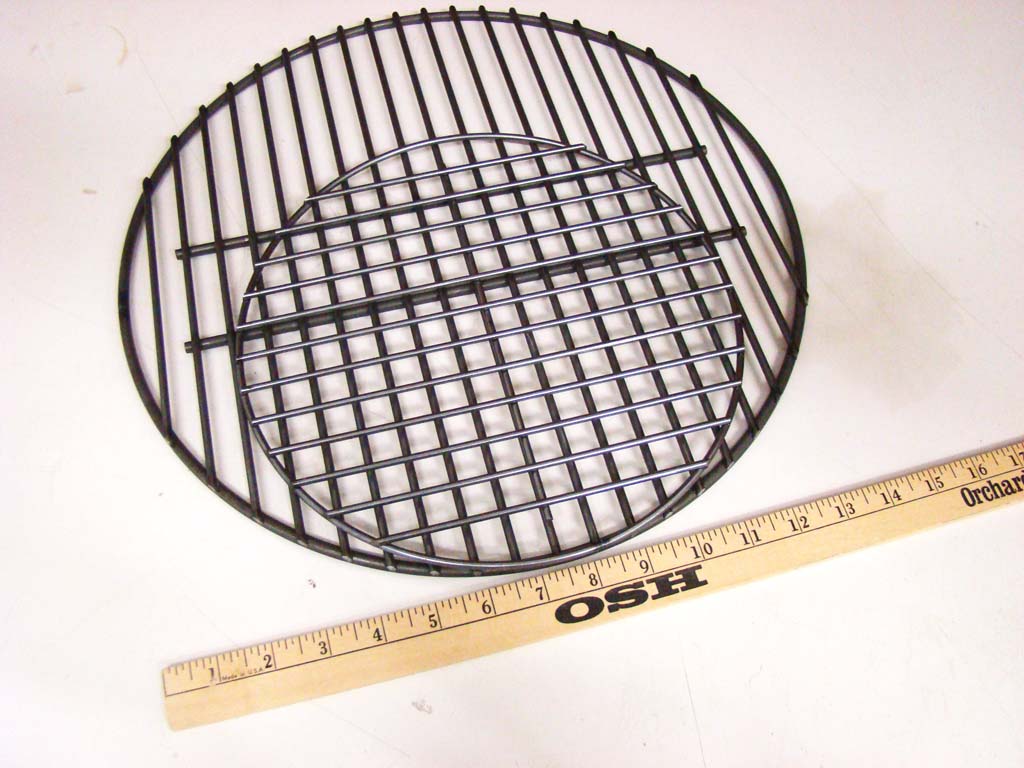
This photo shows the 711001’s charcoal chamber placed inside that of the 721001.
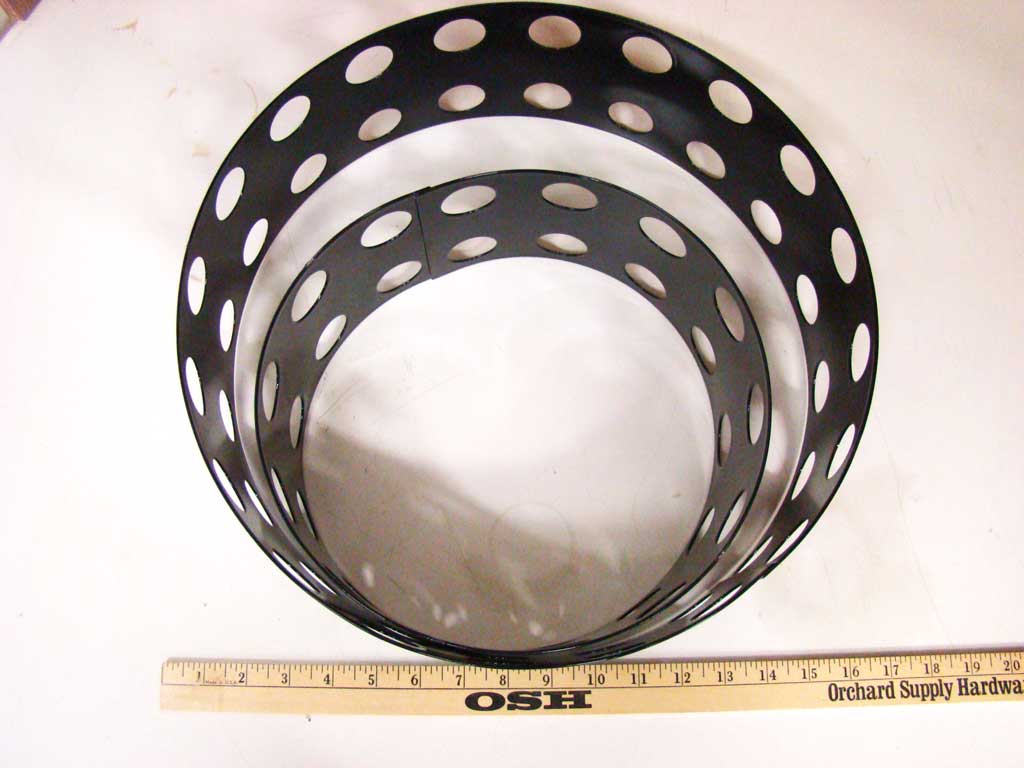
This photo shows the 721001’s external heat shield placed next to the 711001’s internal heat shield.
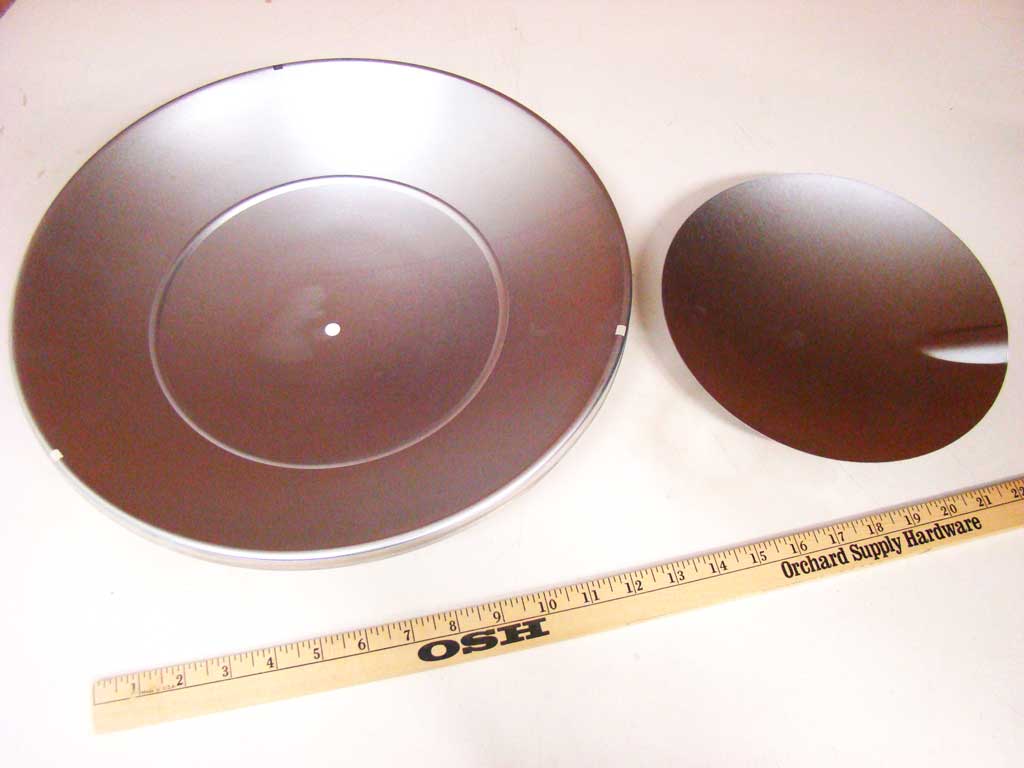
This photo shows the 721001’s water pan next to that of the 711001.
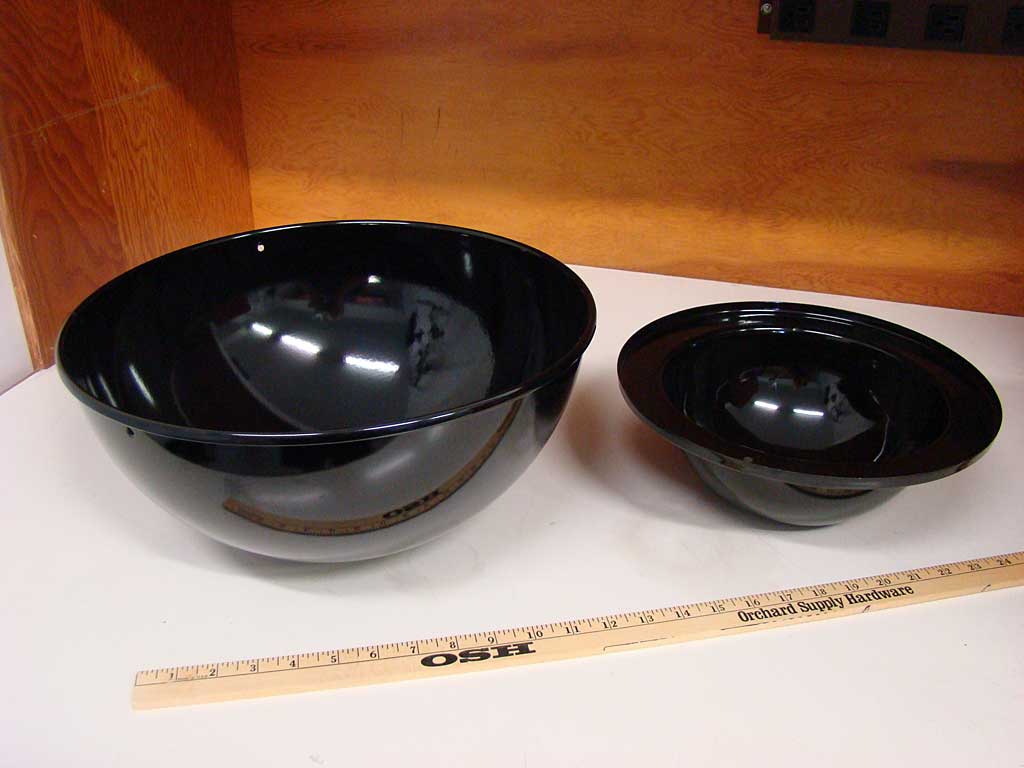
This photo shows the 721001’s leg and grill strap next to that of the 711001.
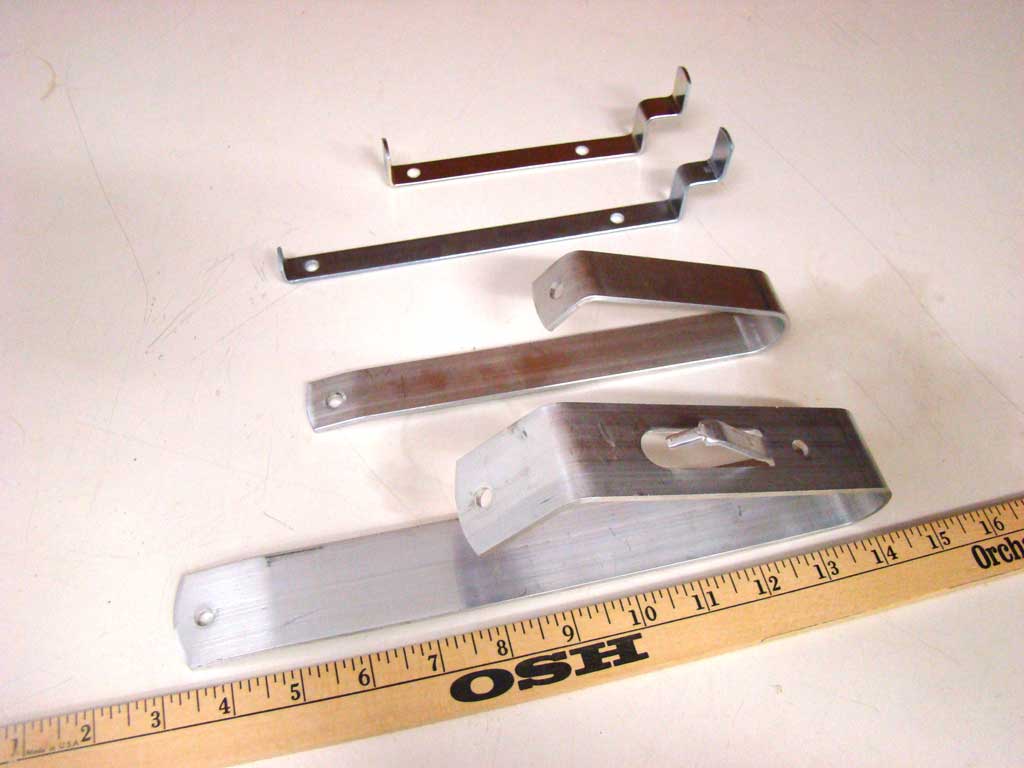
This photo shows the 721001’s lid next to that of the 711001.
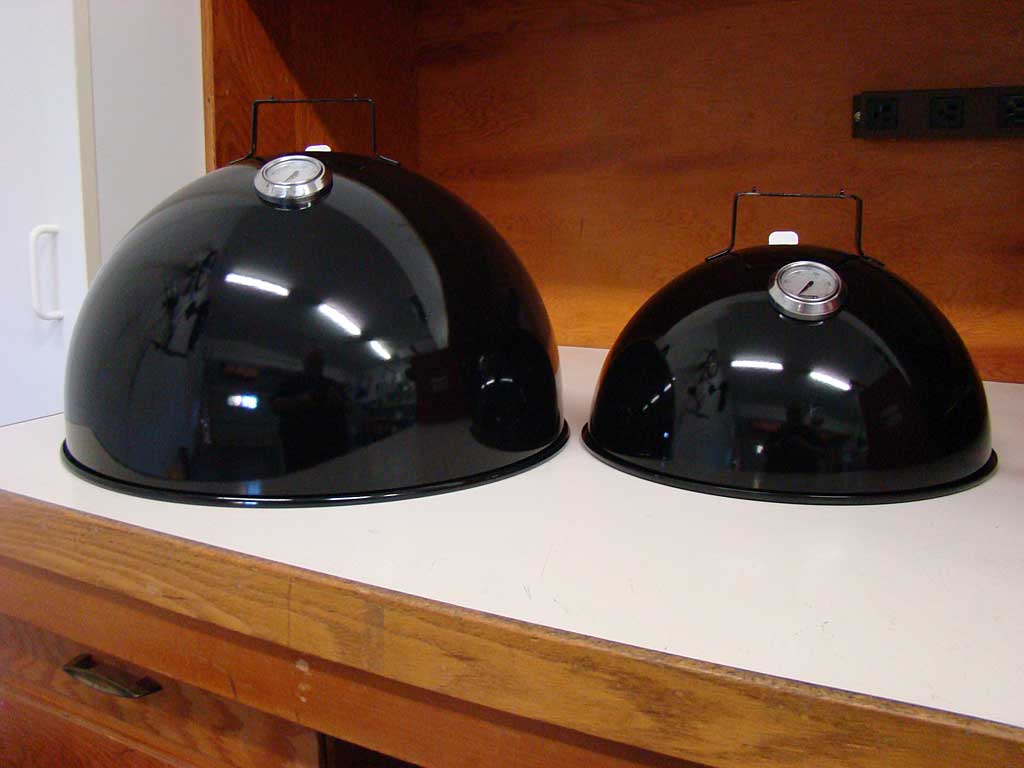
This photo shows the 721001’s middle cooking section next to that of the 711001.
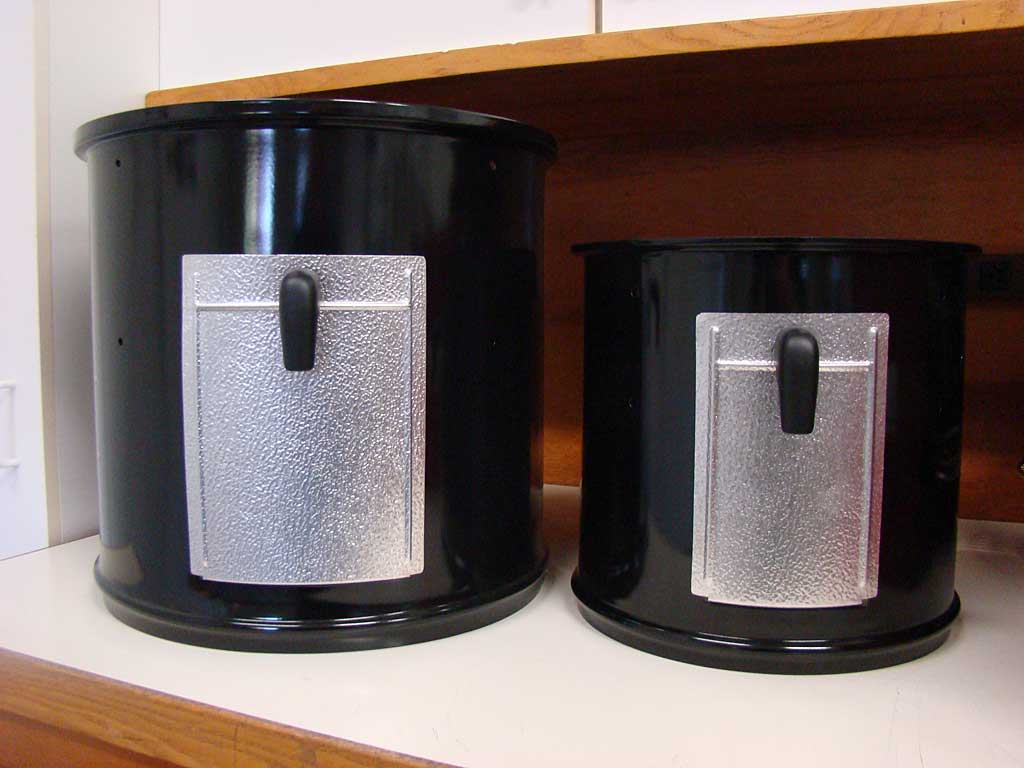
This photo shows the 721001’s access door opening next to that of the 711001.
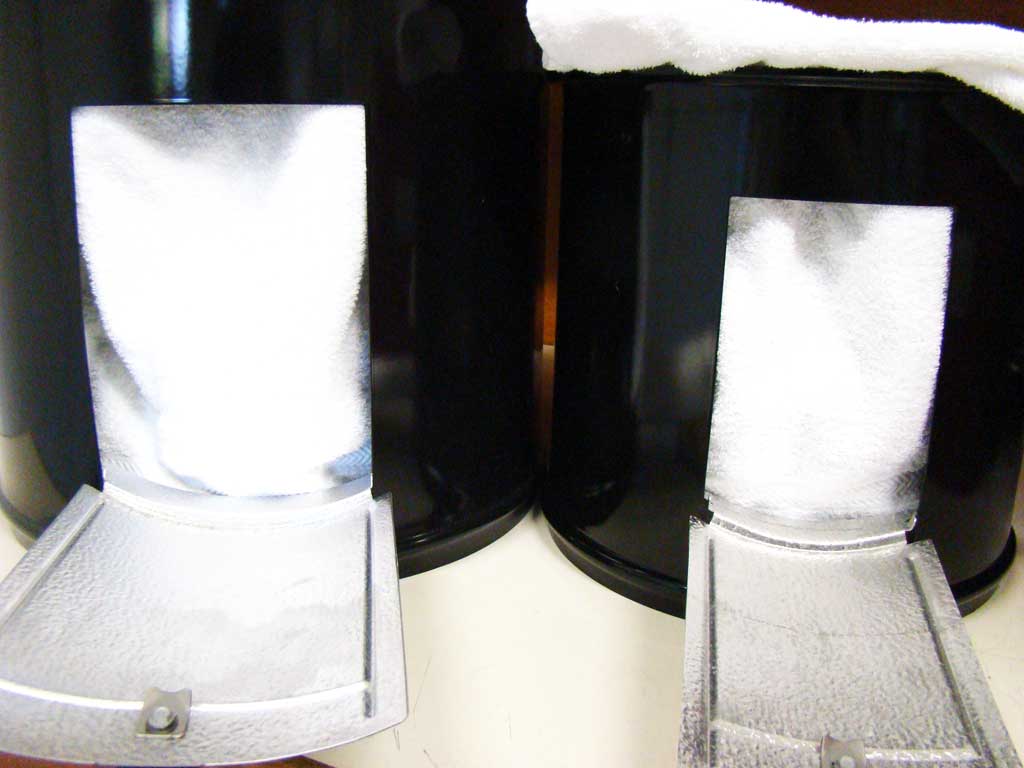
This photo shows the 721001’s charcoal bowl next to that of the 711001.
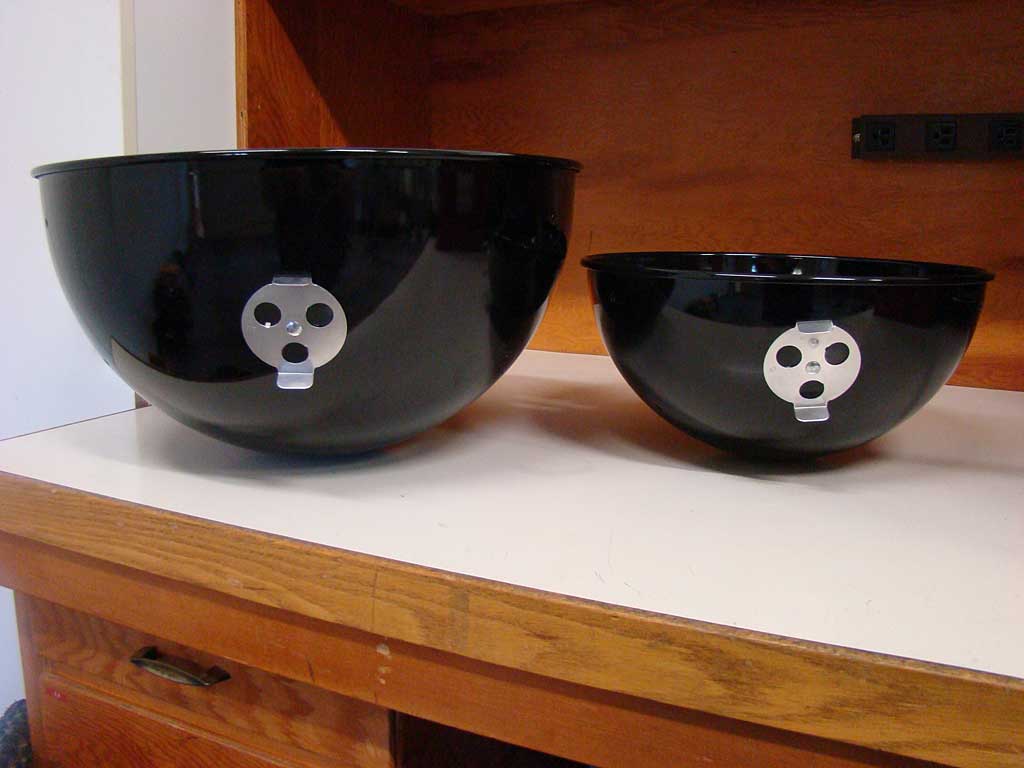
Here are the detailed measurements comparing the 711001 with the 721001 and 731001:
| 2014 Model 711001 14.5″ | 2014 Model 721001 18.5″ | 2014 Model 731001 22.5″ | |
| Height | 31″ | 41-1/2″ | 48-1/2″ |
| Width | 15″ | 18-7/8″ | 22-7/8″ |
| Weight | 22 pounds | 37 pounds | 52 pounds |
| Top cooking grate | 13-1/2″ 143 sq. in. |
17-1/2″ 240-1/2 sq. in. |
21-1/2″ 363 sq. in. |
| Bottom cooking grate | 13″ 133 sq. in. |
17″ 227 sq. in. |
20-3/4″ 338 sq. in. |
| Distance between cooking grates | 5-1/2″ | 7-1/2″ | 9″ |
| Water pan | 11-1/2″ x 4-1/8″ 11 cups (0.6875 gallons) |
14-3/8″ x 7″ 2.5 gallons |
18-3/4″ x 4-1/4″ 3 gallons |
| Distance between water pan and charcoal grate | 6-1/2″ | 5-3/4″ | 12-1/2″ |
| Charcoal chamber | 10″ x 4-3/4″ | 14-1/2″ x 4-3/4″ | 17″ x 4-3/4″ |
| Charcoal grate | 10-1/2″ | 15-1/4″ | 17-3/4″ |
| Distance between charcoal grate and bottom of charcoal bowl | 2-1/2″ | 4-1/2″ | 5-1/4″ |
| Lid | 14-1/2″ OD x 8-3/4″ (including handle) 7″ between inside top of lid and top cooking grate |
18-1/2″ OD x 13″ (including handle) 10-1/2″ between inside top of lid and top cooking grate |
22-1/2″ OD x 14-5/16″ (including handle) 11-13/16″ between inside top of lid and top cooking grate |
| Lid damper | One 3″ damper with three 3/4″ holes | One 3″ damper with three 3/4″ holes | One 4-1/4″ damper with four 3/4″ holes |
| Thermometer | 100-350°F, 5°F increments 1-1/2″ stem |
100-350°F, 5°F increments 1-1/2″ stem |
100-350°F, 5°F increments 1-1/2″ stem |
| Thermometer hole in lid | 3/8″ | 3/8″ | 3/8″ |
| Middle cooking section | 14-3/4″ OD / 13-1/2″ ID x 13-1/2″ 3-1/2″ between screw holes |
18-3/4″ OD / 17-5/8″ ID x 17-1/2″ 6″ between screw holes |
22-7/8″ OD / 21-3/4″ ID x 21-1/2″ 7-1/4″ between screw holes |
| Access opening | 5-1/4″ x 8-1/2″ | 7-1/4″ x 10″ | 12-3/4″ x 13-7/8″ |
| Access door | 6″ x 10″ | 8″ x 11-3/4″ | 14″ x 16-1/4″ |
| Access door knob | 3″ long | 3″ long | 3″ long |
| Grommet hole | 1-1/4″ | 1-1/4″ | 1-1/4″ |
| Silicone grommet | 1-5/8″ x 0.3125″ | 1-5/8″ x 0.3125″ | 1-5/8″ x 0.3125″ |
| Charcoal bowl | 14-1/2″ OD x 7″ (without legs), 9″ (with legs) | 18-1/2″ OD x 10″ (without legs), 12-3/8″ (with legs) | 22-5/8″ OD x 12″ (without legs), 14-1/4″ (with legs) |
| Charcoal bowl dampers | Three 3″ dampers with three 3/4″ holes | Three 3″ dampers with three 3/4″ holes | Three 4-1/4″ dampers with four 3/4″ holes |
| Legs | Three, 8-3/8″ x 1″ | Three, 11-1/2″ x 1-1/2″ | Three, 13-1/4″ x 2″ |
Smokey Mountain Cooker logo: Copyright 1981, Weber-Stephen Products LLC
Diamond pattern access door: 2018 by Chiku
Grommet photo: Copyright 2014, Weber-Stephen Products LLC

